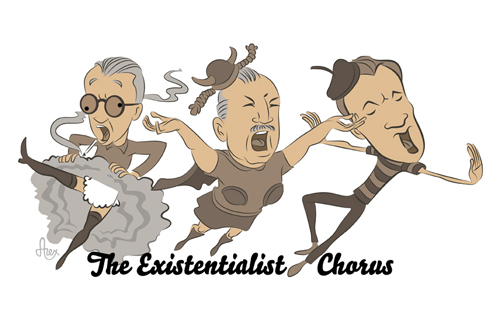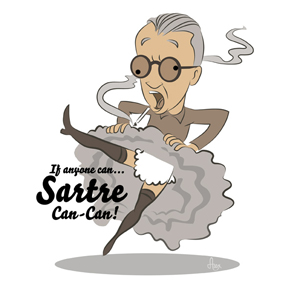
Your complimentary articles
You’ve read one of your four complimentary articles for this month.
You can read four articles free per month. To have complete access to the thousands of philosophy articles on this site, please
Articles
Singing In Choirs: An Existential View
Sara Clethero says, once more with authenticity.
I train singers. Some time ago, I had a call from a very sophisticated local psychotherapist. She had done some voluntary work for a local hospice, and thought she would join the choir there. After some weeks of singing in the choir, someone had taken her aside and explained to her that some people can sing and some can’t: the implication was, she couldn’t. She was devastated, and very articulate about it, as one would expect. She explained to me very eloquently how much singing means to her, and how humiliated she felt by the whole experience. In fact, once we started to work, I found she can sing perfectly well, as most people can. She simply had one or two habits that distorted the sound, but which she could easily address. I have heard other similar stories, just as devastating, from would–be singers, and I think that there is a problem here that stems from a deep philosophical misconception about the nature of music-making, and of singing in particular.

Humans have been singing since prehistoric times (see for example, Stephen Mithen’s work on the evolutionary origins of music, The Singing Neanderthals, 2005). Singing is not something we need to learn to do. But what we do need to do is to put aside some assumptions – cultural, psychological, but chiefly philosophical – which undermine our ability to simply give voice, and which make us believe that we have to make some special effort to do something which is in fact integral to our bodies.
First, we often talk as though we sing for effect, or to make ourselves and others happy. This implies a utilitarian framework about singing; that it is done to create some sort of benefit. But that way of thinking is, I suggest, simply carelessness. Rather, singing is an expression of who we are – of our authentic humanity. It is not an add-on for the sake of giving pleasure to ourselves or to others – although it may do that as well, of course.
This deeper significance is obvious in the context of music in a religious setting. One of the people I met who been treated with contempt by a choir he wanted to join, had spent years singing as a monk, and he powerfully explained to me the significance of singing for him. But it is clear that singing is of much profounder significance than a decorative or utilitarian understanding would imply even for people without a specific spiritual reference.
Being There

The act of singing is fundamentally person- and situation-specific. Every singer, and every body in which the breath flows and the sound resonates, is different from every other. So, in this sense there can be no absolute rules for singing. Even the notes we sing are a cultural variant: in Persian and Arabic music, scales include quarter tones; in traditional Western music, there is instead usually an arrangement of semi-tones and tones. All the rules and principles dreamed up by those whose identity (and maybe livelihood) is bound up with such things are relative to their tonal landscape. And, sometimes, irrelevant to the philosophical issues.
So rather than trying to generalise about the act of singing, let me start from the other end of the telescope, looking first from a global concept of singing towards the specificity of singing.
For me singing is an existential matter. That is to say, it is not an expression of musical rules or principles: it is not something we do to make ourselves or others feel better (although it may do that as well – very nice), and it is not something we do to show how clever or marvellous we are (again, very nice if it does that – but it actually doesn’t matter). Rather, singing is an expression of our humanity – a humanity which is shared with others, and which is therefore most powerful when expressed together with others.
When we sing to other people, in whatever venue or setting, whether a big auditorium or a small gathering, we are drawing them into our ‘lived experience’, to use phenomenologist Maurice Merleau-Ponty’s term. Alternatively, to use Martin Heidegger’s term, ‘being there’ (‘Dasein’), in whatever context, is what matters: being fully aware of and responsive to the present circumstances. However, as Jean-Paul Sartre made very clear in the context of the French Resistance in the Second World War, this is a very demanding frame of action – or of morality. If we allow ourselves to be diverted from it, we will fall short of what we can, and even should be. In fact, this radical presence in the moment is what distinguishes professional singers from recreational ones, not their adherence or otherwise to a particular way of singing.
My singing experience has been mostly in opera houses. But I am continually amazed at the way jazz singers, and in a more extreme way, pop singers, manage to incorporate this understanding of singing into their work. At its best, singing is for them a way of responding, often with great flexibility and subtlety, to their experience of the world, including to the sound of other instruments. And although classical music is strictly governed by the written score, in vocal classical music the same philosophical simplicity of making sound with the body applies. All we can ask of a singer is that they be who they are for us in that moment in time. There is no time or spare intellectual energy for anything else. Indeed, anything else – being happy, public approval, even vocal science – is a distraction.
Of course, we can improve the way our voice reflects who we are – mostly by clearing away the assumptions and hang-ups we have about ourselves and our place in the world. The ‘bel canto’ tradition, with its insistence on breath-led sound, as reflected in the work of, for example, international opera coach Ingrid Surgenor, but also an inspiration to jazz singers such as Tony Bennett, is a wonderful tool for this. Most of the effective training for opera singers helps them to sing ‘on the breath’ using the available space in their resonating cavities (their mouth, pharynx, diaphragm, etc) and using the breathing muscular structures well. In this way, the sound that’s made has a very direct relationship with the embodied self. If what we breath is what we sing, our singing is fundamental to our physical and intellectual space.
For Singing’s Sake

In the present world, moral categories and technical possibilities are changing so fast we hardly have time to be aware of them, let alone respond to them. Perhaps all we can do is to give voice. This gives an added urgency to the need for a more nuanced and sensitive atmosphere around choirs and singing groups. There needs to be a much more thorough awareness of the personal significance of resonating the body to make sung sound.
Organisations often talk about the benefits of singing for conditions such as dementia, and in the words of one ‘arts, health and wellbeing’ website, artshealthandwellbeing.org.uk, the focus is on “the impact that taking part in the arts can have on health and wellbeing.” This is fundamentally a utilitarian argument – reckoning up the total benefit for the greatest number, and promoting it as a public good. But what if what we are talking about is a benefit of a different and more basic kind: something more intrinsic to who we are? Something much more fundamental to our lives and our communal existence than some of the other more ephemeral goods we may covet? This is an age-old problem with utilitarianism – that we may be trying to compare one type of good with something in a different category or of a different kind altogether, such as the value of self-expression for its own sake.
The category of ‘good’ often attributed to singing is that of feeling good. But feelings are very often temporary reactions to outside stimuli, and so one person’s feeling may be irrelevant to others. Meditation can be one way of acknowledging this, and of distancing ourselves from our immediate, unconsidered reactions to the world and our surroundings (anger, etc), and taking a more considered and balanced approach. But there is often little understanding of the more radical personal significance of singing which I am discussing here. For example, stories of children being told to keep quiet when they are taking part in singing events in schools are still distressingly common. But singing with freedom, in the breathing and the use of resonance, will, in any case, be much more compelling to listen to. There is nothing more musically boring than a big group of people singing ‘correctly’ and self-consciously, with all the physical and personal inhibitions that implies. In other words, they are not singing with their whole being and wholeheartedly ‘being there’, but rather, going through the motions of what is considered technically correct. They may have the satisfaction of thinking that they’re reproducing the notes on the page; but the composer will almost certainly have hoped for much greater personal commitment from them. It may be very nice to think that you are flying the flag for true art, and that everyone else is too lazy or too imprecise to get on board. But it doesn’t work, socially, psychologically, or philosophically. And it is a betrayal of our deepest existential need to give voice as part of our community and to affirm ourselves and our place on this planet.

This is partly to do with a generation gap. Traditional choirs and concert halls are overwhelmingly populated by white middle-class over-65s. Meanwhile pop groups and street rappers are pushing the tonal and vocal boundaries, with no permission needed from you or me, thank you very much.
But there is still an area of suffering on the boundaries of the traditional groups, represented by the people I have described, and others, who bear the brunt of the philosophical muddle about the purpose of singing. As ever, philosophical clarity in this area would be a wonderful thing.
© Sara Clethero 2017
Sara Clethero ran the voice department at the London College of Music from 2005-2014. She is the director and founder of Opera Mint, a not-for-profit singing training organisation, and is doing a PhD at Brunel University on existentialism and singing.









